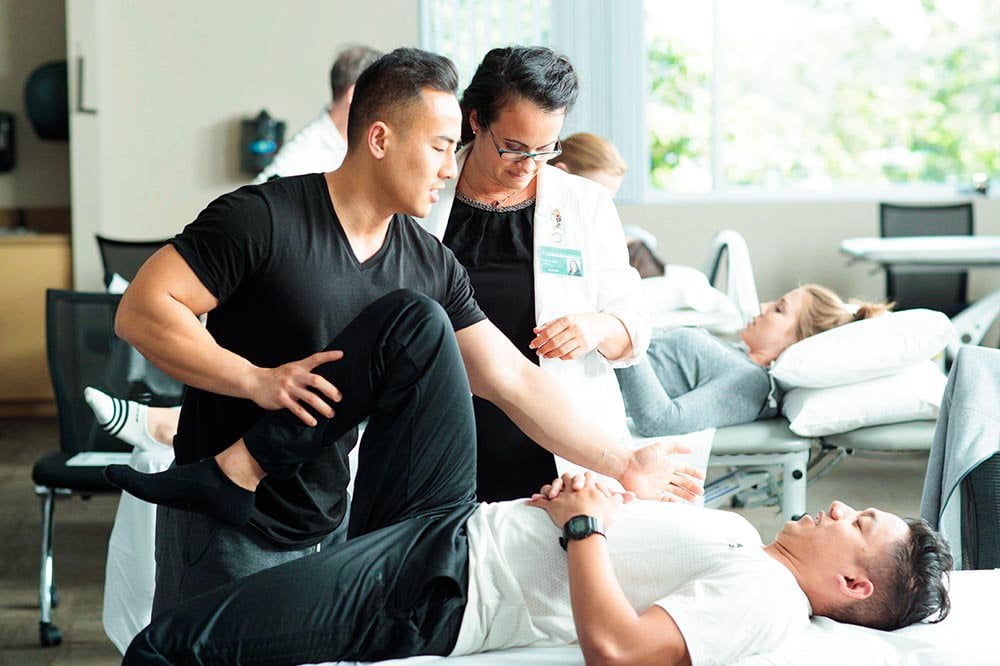Compassionate Treatment in Roanoke: Boost Your Wellness with Specialist Physical Therapists Roanoke
Compassionate Treatment in Roanoke: Boost Your Wellness with Specialist Physical Therapists Roanoke
Blog Article
Recognizing the Role of Physical Specialists in Sports Medicine
Comprehending the function of physiotherapists in sports medication is important for athletes and health care specialists alike. Physiotherapists play a crucial role in examining professional athletes' injuries and conditions, creating customized therapy strategies, and executing rehab strategies. Their experience extends past injury recovery, as they likewise focus on enhancing performance and preventing future injuries. Teaming up with medical care experts and instructors, physical specialists give detailed treatment to professional athletes, ensuring their general health and optimum performance. With their comprehensive understanding and abilities, physiotherapists are important members of the sports medication team, working towards the common goal of keeping athletes healthy and helping them reach their full potential. This short article aims to clarify the crucial function that physiotherapists play in sports medicine, highlighting their contributions to the field.
Examining Athlete's Injuries and Issues
Physical therapists in sporting activities medication play a vital role in reviewing athletes' injuries and problems. The capacity to accurately analyze an athlete's injury is crucial in determining the proper course of treatment and recovery.
During the examination, physical specialists gather crucial details such as the athlete's clinical background, previous injuries, and current signs. They additionally perform a detailed physical evaluation, examining variables such as range of movement, security, toughness, and adaptability. Special diagnostic tests and imaging may likewise be used to more review the injury or problem.
By performing this comprehensive assessment, physiotherapists are able to precisely identify the injury and establish a personalized treatment plan. This may include therapeutic exercises, hand-operated therapy methods, and techniques such as warm or chilly therapy. Additionally, physiotherapists provide education and guidance on correct strategies for protecting against future injuries, along with approaches for maximizing efficiency and reducing the risk of re-injury.
Developing Personalized Therapy Strategies
Physical therapists in sports medicine create individualized treatment plans based upon their thorough examination of an athlete's injuries and conditions. This process involves a thorough understanding of the professional athlete's clinical history, checkup, and analysis tests. By collecting this info, the physiotherapist can recognize the underlying root causes of the injury or condition and establish one of the most suitable training course of treatment.
The personalized therapy plan intends to deal with the specific requirements of the athlete and advertise optimal recuperation. It may consist of a combination of therapeutic workouts, hands-on therapy methods, modalities such as warmth or cold treatment, and education on injury avoidance. When creating the treatment strategy., the physical therapist will additionally think about the professional athlete's goals, sport-specific demands, and timeline for return to play.

Carrying Out Rehabilitation Strategies
The implementation of recovery techniques plays a crucial role in the therapy process for athletes in sporting activities medicine. These techniques are created to help professional athletes recoup from injuries, enhance their efficiency, and avoid more injury. Physical therapists, as professionals in activity and function, are accountable for implementing these methods and leading athletes with their recovery journey.
One of the crucial facets of view executing rehab strategies is click to read more the assessment of the athlete's problem. physical therapy Roanoke. Physiotherapists examine the professional athlete's injury or problem, considering elements such as the intensity of the injury, the professional athlete's objectives, and their existing level of physical fitness. Based on this evaluation, the therapist establishes a customized therapy strategy that consists of details recovery strategies
Rehabilitation techniques can include a variety of interventions such as therapeutic exercises, manual therapy, modalities (e.g., heat, cold, electrical stimulation), and useful training. These strategies are customized to resolve the professional athlete's details demands and objectives, aiming to restore ideal feature, minimize pain, and improve efficiency.
Throughout the rehab procedure, physiotherapists closely keep track of the athlete's progress and make any necessary changes to the therapy strategy. They also provide education and advice to the professional athlete on appropriate type, injury prevention strategies, and self-care strategies.
Enhancing Efficiency and Avoiding Injuries
An essential facet of the physical specialist's function in sports medication is improving performance and protecting against injuries via targeted interventions. Physiotherapists play a crucial duty in enhancing athletes' efficiency and decreasing the threat of injuries by utilizing various approaches and methods.
To enhance performance, physical therapists work closely with professional athletes to create tailored workout programs that concentrate on improving strength, endurance, adaptability, and equilibrium. These programs are made to resolve specific locations of weakness or limitation, allowing professional athletes to reach their complete capacity (orthopedics Roanoke). Furthermore, physical therapists may use strategies such as hands-on therapy, consisting of joint mobilization and soft cells mobilization, to enhance athletes' activity patterns and improve overall efficiency
In terms of injury prevention, physiotherapists utilize their knowledge of biomechanics and activity evaluation to identify possible danger factors that might predispose professional athletes to injuries. They after that develop targeted treatments, such as restorative exercises and proprioceptive training, to resolve these danger factors and minimize the possibility of injuries. Furthermore, physical specialists educate professional athletes on proper workout and cool-down techniques, ideal footwear, and injury avoidance techniques, encouraging them to take an active duty in avoiding injuries.

Collaborating With Health Care Professionals and Coaches
Partnership with health care professionals and coaches is crucial for physiotherapists in enhancing athlete efficiency and stopping injuries in the field of sporting activities medicine. Physical therapists play a critical function in the multidisciplinary team that sustains athletes, and efficient collaboration with various other professionals is essential for providing thorough care.
When dealing with health care specialists, physiotherapists team up carefully with medical professionals, orthopedic specialists, and sports medicine professionals. This collaboration permits for better treatment, medical diagnosis, and analysis planning for athletes. By sharing their proficiency and understanding, physical specialists can contribute important understandings and viewpoints to the team, guaranteeing the very best feasible outcomes for athletes.
Furthermore, partnership with trains is essential for physiotherapists to create and apply efficient training and conditioning programs. Instructors give valuable information about the certain needs and objectives of the sporting activity, along with the professional athlete's training timetable and efficiency assumptions. By interacting, physical specialists and coaches can develop tailored programs that address the athlete's individual needs and enhance their efficiency while minimizing the threat of injury.
Furthermore, collaboration with healthcare specialists and trains expands past the therapy and training stage. Physical therapists typically work closely with these professionals in creating injury avoidance methods and procedures. By investigate this site sharing their competence and understanding, they can contribute to the development of evidence-based techniques that intend to decrease the occurrence of injuries and make the most of athlete efficiency.
Final Thought
To conclude, physiotherapists play an essential duty in sports medicine by reviewing professional athletes' problems and injuries, establishing customized therapy strategies, executing recovery methods, enhancing efficiency, and stopping injuries. They also collaborate with health care professionals and instructors to make sure detailed look after athletes. Their proficiency and expertise contribute significantly to the general health and health of athletes in the area of sports medication.
Physical specialists play a crucial role in examining professional athletes' problems and injuries, developing tailored treatment strategies, and applying rehab strategies. Physical therapists examine the professional athlete's injury or condition, taking right into account variables such as the seriousness of the injury, the professional athlete's objectives, and their present degree of physical health and fitness - orthopedics Roanoke.In terms of injury prevention, physical therapists utilize their expertise of biomechanics and movement analysis to determine possible threat elements that may incline professional athletes to injuries. Physical specialists educate athletes on appropriate workout and cool-down strategies, appropriate shoes, and injury avoidance strategies, empowering them to take an active function in stopping injuries
In verdict, physical specialists play a vital role in sports medicine by assessing athletes' injuries and problems, establishing tailored therapy strategies, applying recovery strategies, boosting performance, and stopping injuries.
Report this page